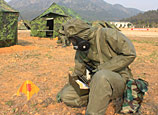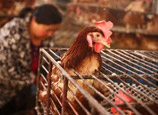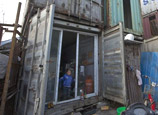
 |
| Brian Zhang (right) chats with students at the Beijing Zhiguang Special Education and Training School about an upcoming recent stage production. (China Daily/Feng Yongbin) |
It has trained them to grow vegetables, but that's just a sample of the opportunities
The old gray Dodge van might look like it's not going to make the 45-minute trip to Beijing's northern suburbs, but it roars up the road as confidently as its driver.
Brian Zhang is driving north of Beijing to Special Commune, a residential community he runs for young people with mental disabilities. You don't have to ride with him for long to sense that he's an actor - and that's very much to the point.
Designed to train students with disabilities in jobs that can help them integrate into society, Special Commune's first task is to make children believe in themselves. One-time child actor Zhang has the perfect answer: Put them on a stage.
Many of the students have Down Syndrome or other genetic disorders. They are a class of people often set aside by a society that doesn't expect them to be participants.
"So they don't expect to be part of the outside world themselves," says Zhang. "That's the first thing we can change: We put them in a production of, say, Snow White and the Seven Dwarfs with a cool costume and a supporting cast that believes in them. The parents see that, our sponsors who can offer potential employment see that, and now everybody is a believer."
Zhang is a believer in social entrepreneurship, a recent phenomenon that he says combines the best of both the business and charity world.
"Making donations makes people feel good," he says, "but we want to break out of that 'begging cup in the hand' mold. It's not sustainable, and it's not healthy for the people who receive the handout to be victims as long as they live."
By teaming up with the Beijing Zhiguang Special Education and Training School, founded by Zhang's mother in 1998, Special Commune each year offers internships for about 30 learning-challenged adults between 19 and 35 years old. During their six to 10 months on the farm, they learn to plant and cultivate vegetables in a food co-op program sponsored by neighboring Little Donkey Farm. Members of the co-op can collect boxes of just-picked produce every week that is fresh, seasonal, organic and provides support for the disabled community.
Besides learning skills that can produce cabbages, leeks and fresh-laid eggs, Zhang says, the students learn to interact with the farm's staff and clients. "Ultimately, they can be employed in basic hotel and hospitality jobs," he says. About 40 have been through the program already, tutored by a staff of 10.
The commune's living space, meanwhile, is designed to teach residents to take care of themselves. And skills taught in the communal kitchens, for example, also help to make them employable in simple jobs.

















 Photo: Bird flu fears hits poultry industry
Photo: Bird flu fears hits poultry industry


![]()
